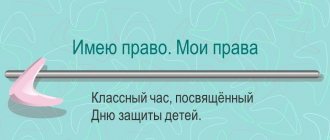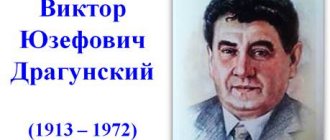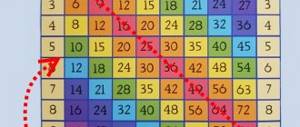Class hour in elementary school. World Children's Day
Class hour World Day of Joy and Happy Childhood.
Author: Alla Alekseevna Kondratyeva, primary school teacher, Zolotukhinsk Secondary School, Kursk Region Description: NOVEMBER 20 - World Children's Day - a holiday of joy and happy childhood, which is celebrated in many countries of the world. And the reason for all this was the Geneva Declaration of 1924 - it was then that the issue of social protection of children’s rights was first raised. I offer you material that can be used for primary and secondary school children as a conversation, class hour, or extracurricular activity. A fabulous quiz dedicated to children's rights can be found on my blog. It serves as a direct continuation of this class hour. Goal: formation of ideas about the main legal documents: “Universal Declaration of Human Rights”, “Convention on the Rights of the Child”, correction of thinking and active-volitional defects of behavior through play. Objectives: 1. To acquaint children with the history of the emergence of legal documents and their significance in the life of a child. 2. Using the example of literary works, introduce the articles of the Convention and show the unity of rights and obligations. 3. Expand the legal knowledge of students, develop the ability to apply it in practice. 4. Foster legal self-awareness and respect for the rights of another person. Equipment: S.I. Ozhegov’s explanatory dictionary, brochures - “Declaration”, “Convention”, “Constitution”; posters for hall decoration; cards with definitions, laptop, (presentations of articles, legal and fairy-tale quiz). Teacher: I bring to your attention fabulous pictures, look at them carefully. (Russian folk tale Geese and Swans)
(H.H. Andersen Thumbelina)
(D.N. Mamin-Sibiryak Gray Neck)
(H.H. Andersen The Snow Queen)
(A.S. Pushkin The Tale of Tsar Saltan...")
(Russian folk tale The Fox and the Hare)
(Russian folk tale The Cockerel is a golden comb)
-Illustrations for what fairy tales do you see? What rights of fairy-tale characters are violated in these fairy tales? (The right to inviolability of the home, the right to physical inviolability, the right to life and freedom, to protection, to live and be raised in a family, to communicate with parents and other relatives, to protect your rights.) - Why do you think so? (Everyone is equal in their rights and no one should violate them.) Teacher: Think and tell me what the word “right” means? (children's statements). — For a precise definition, let’s turn to Ozhegov’s dictionary. I will ask the best reader in our library to read it. (One child reads aloud). LAW is a set of norms and rules established and protected by state authorities that regulate relations between people. — Every person (both adults and children) has their own rights. Human rights are the rules by which he and the people around him live.
People must live according to the rules that are laid down in society, determined by customs, traditions, and the life experiences of many generations, then the principles of reason, justice, conscience and order will operate in this society.
-Tell me, who shows concern for you, tries to protect you from troubles, creates all the conditions necessary for your development, protects your interests and rights? (Children answer). — First of all, the adults who are around you every day are concerned about you: at home - your parents, and at school - the director, head teacher, social educator, teachers, educators and many others. But children are also taken care of by public and government organizations that Their main task is to protect children. The most authoritative among them is the United Nations Organization (UN). It arose after the Second World War, which was unleashed by Nazi Germany, and as a result of which more than 50 million people died and many cities, towns and villages were destroyed. People all over the world have realized the consequences of violating human rights, namely the most important right, the right to life, and that war is the worst way to resolve disputes and problems. Today, humanity has such powerful weapons that if World War III happens, it will destroy all of humanity. To prevent a global catastrophe, the people of many countries decided to unite, so that disagreements and contradictions would force people not to fight, but to enter into negotiations, so that conflicts could be resolved peacefully. It was for this purpose that the United Nations (UN) was created in October 1945. On December 10, 1948, the UN member states signed the Universal Declaration of Human Rights.
— This is a document in which states promised their people civil rights and freedoms: equality of all before the law, personal integrity, freedom of conscience, the opportunity to believe or not to believe in God, and much more. — The Universal Declaration of Human Rights is a necessary and useful document. But it talks about people in general - and not a word about children! But it is children who need special attention, care and protection from the state, since military conflicts, terrorist attacks, accidents, natural disasters, epidemics still occur somewhere, and crimes are committed, as a result of which children suffer. On November 20, 1959, the UN General Assembly adopted the Declaration of the Rights of the Child, and 30 years later, in 1989, the Convention on the Rights of the Child, which was signed by 61 states, including the USSR (September 15, 1990) -Listen to how the Convention differs from the Declaration : The Convention, as an international document, differs from the Declaration in that Declarations are calls to peoples and states to comply with the provisions written in them. And the Conventions, if signed by a representative of a state, are the obligation of that state to strictly follow this international treaty. From the moment of birth, in accordance with the Convention on the Rights of the Child, a small citizen is taken under the protection of the state and has the following rights: Live and be raised in a family Communicate with parents and other relatives Protect your rights Express your opinion The right to a first name, patronymic and last name Change of last name and name The right to property The right to medical care The right to education and others. Thus, in the twentieth century, two holidays dedicated to little boys and girls appeared in the world: World Children's Day (November 20) and International Children's Day (June 1). On November 20, many countries around the world celebrate a holiday of joy and happy childhood - World Children's Day. The Convention on the Rights of the Child adopted in 1989 is called the “Children's Constitution”. The Convention on the Rights of the Child as an international legal act has the highest legal force and is an integral part of the legal system of the Russian Federation in accordance with Art. 15 of the Constitution of the Russian Federation.
— The Convention has 54 articles on the rights of the child. Today we'll look at the most important ones you should know.
Article 1 “A child is every human being under the age of 18.” Until the age of 18, adults are responsible for you; after 18, you are responsible for your actions.
What is the name of this fairy tale? What will happen now? What rule does the Fox break? (Right to security, right to life and liberty) Article 6 “Every child has the right to life.” This is the main right of every person. -Tell me, is it necessary to take care of disabled children and other sick children? (Children's answers) In ancient times there was a state of Sparta, which was famous for its invincible warriors - hardy, strong, healthy, undaunted! But how did the Spartans treat their citizens? As soon as a boy was born, they examined him and decided: if he is strong and healthy, let him live. And if he is weak, sick, Sparta does not need him. Throw him off the cliff! But a weak child, if he trains, can grow up strong and dexterous: he can become a scientist-inventor or a talented artist, a wise doctor or even a commander! It’s just that the sick need to be treated, the weak need to be helped...
Alexander Vasilyevich Suvorov (November 24, 1730—May 18, 1800) was a great Russian commander, military theorist, and national hero of Russia. A.V. Suvorov grew up as a very sick and frail boy. Great willpower and physical training allowed him to become a great commander of Russia. Article 7 “From the moment of birth, a child has the right to a name.” Each of you has a first name, last name and patronymic. This information is recorded in a special document - a birth certificate.
Here you also write your date of birth, where you were born and who your parents are. This is the child's first document. Each of you has it! When you turn 14 years old, another document is issued. Who knows what it's called? (Passport) The passport changes at the age of 20 and 45.
Article 13 “The child has the right to freely express his opinion.” The child can express out loud everything he thinks; write and even publish in a newspaper or magazine. Article 16 “Everyone has the right to own property and the inviolability of their home.”
No one has the right to deprive you of your property or home. Remember in which fairy tales this right is violated? (Fairy tale “The Three Little Pigs”)
(“Zayushkina’s hut”)
Article 28 “The child has the right to free education” Not in all countries children have the opportunity to receive free education. This once again confirms that our state takes special care of the future of our children. Therefore, you must exercise this right and study well.
Article 31 “Every child has the right to rest and leisure.” You have a responsibility to respect the rights of others.
Article 32 “The child has the right to protection from exploitation.” What does the word "exploitation" mean? (From S.I. Ozhegov’s dictionary: “Exploitation is the appropriation of the results of someone else’s labor”). Illegal use of other people's labor for one's own purposes. With an 8-hour working day for adults, children from 14 to 16 years old have the right to work 4 hours a day, from 16 to 18 years old - 6 hours a day in free time from school with the consent of their parents or guardians. Very often, declaring one's rights serves as an excuse for not wanting to do anything, to receive everything and not give anything in return. For example, you are asked to take out the trash, clean your room or closet with personal belongings.
You will say: “You have no right to use children’s labor.” -Tell me, will you be right? Of course not. This is not forced labor, but help with housework that is feasible for you, self-service. Article 37 a) “No child shall be subjected to torture or other cruel treatment or punishment.”
b) “No child shall be deprived of his liberty by unlawful means.” The arrest or detention of a child is carried out in accordance with the law and only as a last resort. Do you know at what age criminal liability begins? (From the age of 16, for especially serious crimes - from the age of 14). Rights do not need to be purchased, earned, or inherited. They belong equally to all people, regardless of nationality. Rights cannot be taken away—no one can take away the rights of another person, for any reason. We are all born free and equal. All children are equal in their rights and no one should violate them! To become a full-fledged citizen of society, you need to know your rights.
I invite you to exercise your right to rest and leisure and answer the quiz questions. QUIZ "Child's rights"
1.Name the basic law of the state. (Constitution of the Russian Federation)
2.What international document enshrines children's rights? (The Convention on the Rights of the Child is an international legal instrument.)
3.In what year was the Convention on the Rights of the Child adopted?
(On November 20, 1989, the UN adopted a special document called the “Convention on the Rights of the Child”) 4. What is law? (RIGHT is a set of norms and rules established and protected by the state authorities that regulate relations between people.) 5. A child is...? (A child is every human being under the age of 18. Article 1) 6. Which children are entitled to special care and protection? (All children have this right). 7. The child has the right: Every child has the right to life. Article 6 The child has the right to freely express his or her opinion. Article 13 8. At what age do citizens begin to fully exercise their rights? (Article 60 of the Constitution of the Russian Federation states “A citizen of the Russian Federation can independently exercise in full his rights and obligations from the age of 18.”) 9. How old is the Convention on the Rights of the Child this year? (26 years old) 10.What identification documents does each child have? (Up to 14 years of age - a birth certificate, and then a passport). -Conclusions: You cannot put your rights above the rights of other people, then your rights will be respected. Remember the golden rule of morality: “Never do to others what you would not wish for yourself.” These words belong to the ancient philosopher - Chinese thinker Confucius.
— Now let’s listen to the poems: 1. We are citizens, but still children. Sometimes there is a reason to protect ourselves. That's why the Convention was invented in the world, So that we know our rights and defend our honor. 2. The Convention gives everyone an equal right, So that there are much fewer children’s tears, They not only dream about the happiness of children, They are not afraid of problems, they solve them together. 3. Fifty-four - neither more nor less. There are many laws for the happiness of children, so that there are fewer violations on our entire planet. 4. The main right to life and freedom, to love and family care. For study, relaxation, hobby. Social protection and treatment. 5. I understood the law, but still, friends, I’m not very mature - that’s the problem. They won’t listen to me, they might beat me. How can I resolve the issues myself? 6. Don’t be afraid, your family is with you, the Teacher will not leave you in trouble. There are many good people in the world - They will help, stay cheerful. 7. Until the age of 18, your rights are protected by adults, they are always ready to support you. Do you understand now? Well, in general - yes! Teacher: Guys, tell me, what was important for you in class today? — Why do you need to know your rights? (You need to know them in order to be able to protect yourself. Knowing your rights is very useful, it gives you self-confidence). — You need to not only know your rights, but also always remember your responsibilities. “I hope that the knowledge gained will definitely be useful to you in your future life.” Our class hour has come to an end. “Children should live in a world of beauty, games, fairy tales, music, drawing, fantasy, creativity.” Vasily Aleksandrovich Sukhomlinsky Thank you all for your participation and attention!
We recommend watching:
Theatrical game program for 4 - 8 grades KVN in 3rd grade. Script of KNV in primary school for the 100th anniversary of V. Dragunsky Script of a fairy tale about mushrooms with roles for younger schoolchildren
Similar articles:
Class notes on children's rights for 3rd grade
Business game for 4th grade. Human rights
Physical education lessons for elementary school in verse
Organization and holding of leisure activities, games and competitions in institutions of additional education for children
Extracurricular activities for primary school
Summary of the theme day "World Children's Day"
Theme day
"World Children's Day"
Conducted:
Shlender L.N. Nikitina N.A.
The date of the:
November 20, 2018
Age group:
senior gr. No. 11
Subject:
"World Children's Day"
Target:
generalization of children's knowledge about the basic rights of the child.
Tasks:
OZ:
form a negative attitude towards illegal actions; encourage children to protect their rights
RZ:
develop memory, observation skills;
OT:
develop respect for the rights of others; promote the formation of an active life position;
Equipment:
illustrations on the topic, material for didactic games, pictures with the letter “I”, family trees, calendar, screen, image on the mitten of the hero “Abstract Man”.
Vocabulary work:
equal, children's rights.
Preliminary work:
Reading works of fiction: K. I. Chukovsky “Doctor Aibolit”, “Barmaley”, “Cockroach”;
N. Nosov “On the Hill”; I. Turichin “The Man Got Sick”; V. Oseeva “The Magic Word”; Russian folk tales: “Snow Maiden”, “Masha and the Bear”, Belarusian fairy tale “Zhiharka”, etc. Examination of illustrations. Drawing on the theme “I love my family”, “My family” Lesson progress:
Organizational moment:
Hello guys! Let's start this day with the formula of love. Let's stand in the “circle of joy” and smile at each other.
Repeat after me the following words and movements: I love myself so much (hand on my heart), That I can love you (hand on my neighbor’s shoulder). And you will begin to love yourself (put your hand on your neighbor’s shoulder). And you can love me (hand on heart).
The main part of the lesson. Game exercise “Address each other by name”
Guys, stand in a circle, pass the ball, turning to face your neighbor, and address him kindly. (The teacher starts the game first. The game ends when the ball returns to the teacher).
Event "World Children's Day"
Goal: to consolidate children’s knowledge about the World Children’s Day holiday. Children sit on chairs. The Absent-Minded Man appears. (doll) Absent-minded: Hello, guys! I am the Absent-Minded Man from Basseynaya Street. And I didn’t come to you empty-handed, I brought you a gift. (takes out a calendar).
Guys, who knows what this is? (children's answers).
Why in the calendar are some numbers black and others red? Children: Red numbers are holidays, and black numbers are everyday life. Absent-minded: I think that all these holidays were invented for adults. Are there any holidays for children? Children: Yes, there are. Children's Day, World Children's Day. Absent-minded: World Children's Day? What kind of holiday is this? Educator: there is even a poem about this holiday.
listen to him. What a holiday! What a day! Non-adults day! Children's Day! Children are good, Children are cool! Without children, life is not life, This is immediately clear! Absent-Minded Man: I was very happy that the children had their own holiday. Why is it called World Children's Day? Children: Because it is celebrated all over the world. Educator: There are many different countries and peoples in the world. (Show the card on a magnetic board).
Let's remember what children from different countries are called. Game exercise “Children of the Earth”
Who are the children of Kazakhstan? - Kazakhs Children of Russia? - Russians. What are the children of Italy called? - Italians. Children of Belarus? - Belarusians. Children of England? - English. Children of France? - French people.
Educator: Every child, every person has his own name. Absent-Minded Man, what's your name? Absent-Minded: I am an Absent-Minded Man, but I don’t know what my name is. Nobody gave me a name. Educator: Guys, how can this be? The child's name is given by the parents at birth. Absent-Minded: And I’m a fictional character, I don’t have parents, so no one gave me a name! Educator: Absent-minded man, don’t be upset. The guys and I will come up with a name for you. What should we call it? We need to come up with a name so that it is not repeated among the children in our group. Children: Anton, Igor, Oleg, etc. Educator: Absent-Minded Man, which name did you like best? Absent-minded: Oleg. Educator: Now, your name is Oleg. Absent-minded: Thank you, now I also have a name! Oleg: Yes, you have a lot of fun here! (Starts turning his head, looking for something.) Where is he? Ah, here I found it! (Finds an envelope attached to the front wall of the screen). This envelope contains letters. They need to be taken out and laid out on an easel. Help me. Teacher: (opens the envelope, takes out cards with the letter “I”, 7 pieces, lays them out on the board).
How many letters "I"? That's right, seven! Family! What are we doing? Children: Family! Oleg: I know what family is! I read somewhere... or someone said... well, I forgot again. Educator: And you know, Oleg, you can not only talk about family, write poetry, read stories. Can you make family trees? Oleg: How interesting! And what is it? Educator: We’ll show you now. Look what trees the children of our group and their parents have prepared. Oleg: Beautiful! Why does a person need to be able to make a family tree of his family? Children: To know all your relatives. A child's story (according to the family tree). Educator: And our palms are very similar to a family. Finger gymnastics “My Family”
One two three four! (claps to count) Who lives in my apartment? (bending closed fingers to palms) One, two, three, four, five (claps to count) I can count them all! (spread your fingers to the sides) Dad, mom, brother, sister, Murka the cat, two kittens, my goldfinch, cricket and Me. (alternately stroking fingers) That's my whole family!
OUD according to the schedule.
Afternoon.
Educator: Oleg, can you solve riddles? We know a lot of riddles and want to play with you again. Oleg: I agree. What should I do? Educator: You need to be attentive and smart! Riddles about family
1. This is when everyone is together: dad. Mom, grandma, grandpa, me? (family) 2. He’s old, but that’s okay, there’s no one kinder than him, he’s my dad’s dad, and for me he’s….(grandfather) 3. We have a girl in the house. Now I’m her brother, and she’s my….(sister ) 4. A place where the whole family goes (home) 5. She is not old at all, although she is completely gray-haired. I will sit next to her: “Continue the story.... (grandmother).” 6. Mom has a sister. You will not find a kinder person. I am very proud, because she is mine (aunt). 7. My aunts and uncles live on the Volga. You will find me there on vacation. From mom and dad, I am a messenger to them. They love me, because I am (nephew) 8. My mother’s brother came to us, I’m very glad to meet him! He repeats looking into my eyes: “Shake your hand, because I’m your (uncle).” 9. She remembers and knows everything in the world, And her grandmother calls her mom, And doctors often come to her house, She’s my great, she’s my great... . (great-grandmother) The most gentle, kindest, most beloved person for all people? (mother) Educator: There are different families, large and small. And for the family to be friendly and happy, everyone helps each other and has their own responsibilities. Guys, tell me, what responsibilities do you have? Child: I have to clean up my toys after playing. Child: I make the bed. Child: My sister and I help our mother clean the house. Child: Children are required to obey their parents. Educator: Oleg, we will now show you different actions, and you try to guess who is doing it.
Game "Who is doing what?"
(played in the form of a game “We won’t tell you where we were, but we’ll show you what we did”). Grandmother - bakes pies, knits socks, mittens, takes care of her grandchildren... Mom - cooks dinner, washes, irons, Dad - beats, twists, pumps up, drives a car Grandfather - digs in the country, Educator: Every person, when first born, is very small child - baby. The years go by. A person grows and turns from an infant into an adult. An adult will live, live and begin to grow old. He grows old, grows old, and becomes very old. This happens to all people. An adult starts a family. You all have a family. You are the happiest children in the world, because your families love each other and everyone lives happily together. Let's try to lay out a chain of pictures from a baby to the oldest person. Game "Collect a chain".
Two teams place pictures on different tables in an ascending chain. (baby girl – preschooler – schoolgirl – student – mother – grandmother; baby boy – preschooler – schoolchild – student – dad – grandfather). Oleg: thank you guys! I am very glad that I met all of you. And most importantly, now I also have a name! I'll go meet other children. And I will tell everyone about such a wonderful holiday for children - World Children's Day. Goodbye! Educator: It’s nice that our Oleg left happy. And we spent an extraordinary day today.
Let us also feel how pleasant it is to give our warmth to others.
Training "Save the Chick"
Imagine that you have a small helpless chick in your hands. Extend your arms with your palms facing up. Now warm him up. Slowly, one finger at a time, fold your palms, hide the chick in them, breathe on it, warming it with your even, calm breath, place your palms on your chest, give the chick the kindness of your heart and the warmth of your breath. Open your palm and you will see that the chick has joyfully taken off, smile at it and don’t be sad: it will fly to you again.
Reflection:
Today is your holiday, guys! All the children of the vast Earth rush to each other with congratulations, Wishing health and love! And we, dear ones, wish you: Grow and make us happy, May your wishes come true and the world be kind to you!
Children and their teacher sing the song “We advise everyone to be friends”







